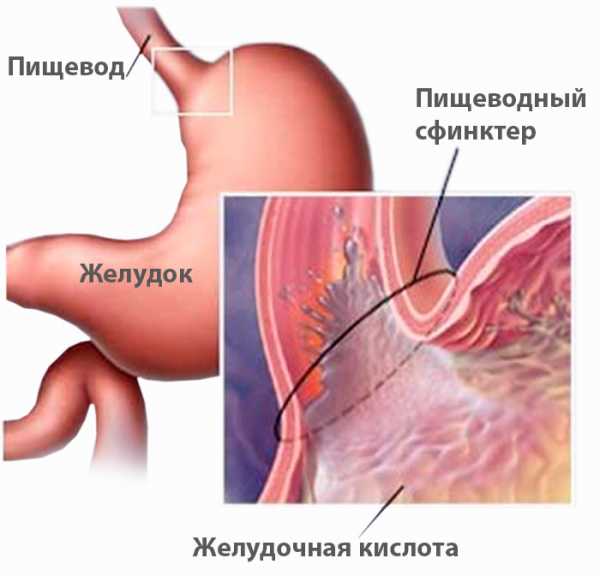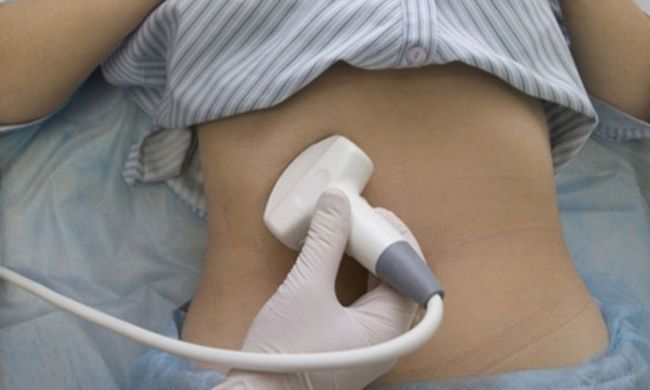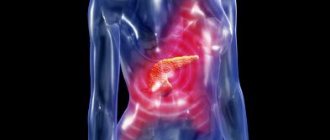Lazy stomach: symptoms, treatment, folk remedies
According to statistics, in Russia about 2/3 of the population is susceptible to lazy stomach syndrome (dyspepsia).
This is due to the prevalence of negative factors that provoke this disease. Treatment of dyspepsia depends on the cause of the stomach malfunction.
To eliminate unpleasant symptoms and overcome the problem, an integrated approach is required, which includes drug treatment and adherence to a special diet.
In certain cases, treatment with folk remedies is also possible.
As mentioned above, dyspepsia is a disturbance in the functioning of the stomach.
Disturbances can be different, and they depend on the specific cause that caused the disease. But they all boil down to the fact that gastric motility is somehow disrupted.
The organ cannot contract and push food further along the digestive tract. In addition, food lumps are poorly crushed and processed.
Food lingers in the stomach cavity and, accumulating, causes discomfort and a feeling of fullness. In advanced cases, food masses begin to decompose.
Dyspepsia is caused by various factors, based on the nature of which it is divided into 2 types.
- organic dyspepsia, which implies pronounced pathological processes in the digestive system;
- functional dyspepsia, in which structural changes in the digestive tract are not necessarily present.
The organic form of dyspepsia most often occurs as a complication against the background of the underlying current disease of the digestive system (peptic ulcer, reflux, pancreatitis or cholelithiasis), and its treatment is more specific.
Functional dyspepsia is diagnosed when there are no organic lesions in the digestive tract.
The exception is chronic gastritis, in which the activity of the stomach is often disrupted, but no pronounced clinical manifestations of the underlying disease are observed.
Among the main causes of lazy stomach syndrome are:
- improper diet;
- injudicious use of medications;
- stress;
- sedentary lifestyle;
- infection (Helicobacter);
- excessive release of hydrochloric acid;
- disturbances of peristalsis;
- exposure to low frequency ultrasound.
Symptoms occur immediately after eating or a short period of time after it.
The main signs of dyspepsia are:
- discomfort and feeling of fullness in the stomach (even from small portions of food);
- frequent heartburn;
- belching;
- pain in the epigastric region;
- bloating;
- vomit.
The appearance of such symptoms may be isolated in the event that they are caused by a failure in the usual diet or a stressful situation (functional disturbances in the functioning of the stomach).
Then the problem can be dealt with using medications (Maalox or Phosphalugel) or folk remedies (chamomile tea).
But sometimes such symptoms haunt a person for a long time.
In this case, you should contact a specialist and undergo a series of studies, as a result of which it will be possible to identify the causes of the problem.

This set of symptoms is actually quite nonspecific. Similar symptoms can occur in many diseases.
Therefore, it is important to conduct a full diagnosis. Its goal will be to identify other pathologies and study the characteristics of current disorders. Only after receiving an accurate diagnosis can a treatment plan be drawn up.
Diagnosis may require many studies:
- general blood analysis;
- biochemistry;
- stool tests;
- Ultrasound;
- X-ray examination;
- antroduodenal manometry, esophagomanometry and electrogastroenterography, studying gastrointestinal motility;
- esophagogastroduodenoscopy;
- scintigraphy;
- analysis of the contents and mucous membrane of the stomach for bacteria;
- daily studies of stomach acidity levels.
When organic causes of symptoms are excluded, functional dyspepsia is diagnosed when the discomfort is constant and bothers the patient for about 3 months a year.
Moreover, symptoms do not have to occur every day. What is taken into account is that the manifestations of the disease are frequent.
For diagnosis, it is important to exclude the relationship between the severity of symptoms and bowel movements.
With functional dyspepsia, bowel movements should not cause a feeling of relief, as, for example, with irritable bowel syndrome.
In this case, it is necessary to maintain the functioning of the stomach at the desired level with the help of antacids and other drugs.
If an infection is detected, antibiotics are prescribed. Antacids will also help in eliminating the symptoms of functional dyspepsia. In both cases, treatment involves diet.
But if with organic disorders it will be more focused on the main ailment, then with functional dyspepsia the diet is not so strict and is aimed at improving the processes of digestion and peristalsis.
Unexpressed functional disorders can be treated with folk remedies.
Treatment with folk remedies involves the use of foods that stimulate peristalsis and normalize the pH of the stomach, as well as reducing the influence of negative factors.
It is recommended to avoid stress and balance your diet. It is better to eat often, but in small portions. The diet should focus on heat-treated vegetables.
Prunes, dried apricots, raisins, dates, figs and dried apples stimulate the stomach well.
To start gastrointestinal peristalsis, it is recommended to make a special nutritional mass from the above products.
To do this, having collected them in equal proportions (100 g each), you need to scald the ingredients with boiling water and, crushing them in a blender, turn them into a homogeneous mass.
You need to add another 100 g of flax seeds, nuts and honey to it. You need to take 1 teaspoon of the mixture in the morning half an hour before breakfast and in the evenings before bed.
To enhance the effect, add mint, St. John's wort or sage. These herbs will also be useful when mixed with green tea.
To make treatment with folk remedies more effective, you need to give up alcohol, smoking and add physical activity.
Lazy stomach syndrome can be either an independent phenomenon or a sign of more serious diseases.
Folk remedies can help and restore the functioning of the stomach, but not when the root causes are of organic origin. Then treatment is possible only under the guidance of a specialist.
Sports and exercise
The “lazy stomach” syndrome (how to make it work, you can read in the article) is a serious problem that requires an urgent solution. Start exercising and you will notice how your overall well-being improves. Move and walk as much as possible. Don't miss the stairs. Walking uphill will have a positive effect on your digestion. Dancing and any sports games will relieve you of stagnation in the stomach.
Start taking care of your health right now. Sports, combined with proper nutrition and traditional methods, will relieve you of abdominal discomfort. Be friends with your stomach, and it will thank you. If the symptoms of the disease do not go away, go to the hospital immediately. If the disease is not diagnosed in time, it can be fatal.
How to help a lazy stomach?
11:53, 05 May 2014 1 0 546
How to help a lazy stomach?
The causes of problems with the functioning of the stomach and intestines are:
In order to determine whether you have dyspepsia, you need to know the symptoms of this disease:
- feeling of heaviness in the stomach after eating;
- quick satiety even with an acute feeling of hunger;
- nausea;
- constantly recurring belching, possibly with an unpleasant odor;
- pain in the upper abdomen;
- increased gas formation in the intestines.
Causes and treatment of lazy stomach syndrome
What factors negatively affect the functioning of the gastrointestinal tract and disrupt their functioning? What causes changes in motor skills? There may be several reasons for this and they are all quite logical.
- Poor nutrition, overeating, abuse of fatty and unhealthy foods.
- All kinds of pathologies, disruption of the correct functioning of the gastrointestinal tract (liver failure, peptic ulcer, gastritis, tumors).
- Age-related changes. Decreased production of essential enzymes and weakening of the gastric muscles.
- Diseases of a neurological nature.
- Hormonal imbalance (menopause, diabetes, thyroid disease).
- Bad habits, an abundance of stressful situations.
Failure to adhere to a proper diet is one of the most common and common causes of lazy stomach syndrome.
There are 2 main categories of such disorders: functional (impaired motor skills) and organic. The latter is expressed by more intense and pronounced symptoms, and damage occurs at the structural level. Treatment requires a lot of time.
Categories, in turn, also have several options. Each individual type of gastric motility disorder expresses its characteristic symptoms.
Errors in nutrition cause:
- Fermentative dyspepsia. Standard symptoms are supplemented by belching (sour), dizziness, severe nausea and even increased irritability.
- Fatty dyspepsia, which is caused by the abuse of fats.
- Putrefactive dispersion, accompanied by general weakness, diarrhea, loss of appetite.
Insufficient production of enzymes leads to dyspepsia:
- gastrogenic (lack of gastric enzymes);
- hepatogenic (bile deficiency);
- pancreatogenic (deficiency of pancreatic enzymes);
- enterogenous (lack of intestinal juice).
There is also dyspepsia caused by infection, intoxication (with poisoning of various natures) and pathological (congenital).
These include:
- feeling of heaviness;
- bloating, intense gas formation;
- pain, mainly in the upper abdomen;
- nausea;
- belching.
To improve motor skills and stimulate digestion, basic rules should be followed.
- Food should be supplied frequently and in small portions, strictly in accordance with the regimen.
- While eating, you should chew your food thoroughly.
- Minimize the consumption of animal fats (butter, especially fatty meats).
- Give up bad habits (smoking, alcohol).
- Carefully monitor your weight and avoid significant deviations from the norm (obesity, weight gain).
- Have dinner no later than 2 hours before bedtime.
- Try to avoid excessive stress (physical and emotional).
Drug treatment is prescribed by a doctor depending on the research results and the condition of each patient individually. As a rule, it involves taking medications that stimulate the production of enzymes in the stomach and other organs of the digestive system, and if an infection is detected, they must be combined with antibacterial drugs (antibiotics).
Impaired motility does not affect the quality of life in the best way and accompanies almost all diseases of the gastrointestinal tract. When the stomach is not working well, even your favorite dishes are not pleasing, and eating itself does not bring proper pleasure. It is important to seize the moment and not ignore the symptoms, then the treatment will be much simpler and more effective. This will avoid more serious consequences. Listen to your feelings, do not tolerate pain and do not self-medicate!
If you liked the material: rate it and share with friends
| (Not rated yet) Loading. |
If you need a doctor, we will select a doctor for you for free or find the clinic closest to you, leave your contact information and
our managers will contact you within 10 minutes
Causes of the disease
How to make your stomach work? This is not an easy task. But it is even more difficult to find out what causes such an unpleasant illness. The most common is poor nutrition. And gastroenterologists confirm this information. First, you will notice how your stomach begins to “growl”, after which nausea and pain in the abdominal area appear.

If you overeat very often, eat a lot of fatty foods, and also have diseases of the oral cavity and teeth, then do not be surprised at the appearance of negative symptoms. Very often, indigestion occurs after eating a large amount of sweets.
Lazy stomach - symptoms, treatment, prevention of the condition
How to cure gastritis yourself? Don't poison yourself with pills! There is a safe home method.
Functional dyspepsia syndrome is associated with several sources:
- In the gastric region there are unpleasant sensations with a combination of heaviness, which begin to progress after eating food.
- After a meal, a painful sensation may occur in the gastric area.
- Very fast satiety after eating a small portion of food.
- The feeling of mild nausea may intensify and be accompanied by vomiting.
- Flatulence, gas content in the stomach.
In addition to the above general symptoms of functional dyspepsia, there are other signs depending on its type. There are 4 types of dyspepsia:
- Fermentation form, accompanied by a high level of formation of gaseous substances, moving them along with gastric juice and causing rumbling. A person experiences a frequent urge to defecate.
- The ulcerative form of dyspepsia is characterized by the presence of constant or frequent pain.
- The putrefactive form reveals itself as a decrease in appetite, general malaise, and poor health.
- With the pancreatic form, a person has increased irritability, often defecates with loose stools, has stomach rumbling, and a sharp decrease in appetite.
The use of medications should be discussed with a doctor after undergoing diagnostic procedures. You should not make a diagnosis on your own without taking into account your general health condition. The doctor may prescribe medications to improve the secretion of digestive enzymes if enzyme deficiency is detected. Detection of Helicobacter pylori in the stomach requires the selection of antibacterial agents.
- daily introduce into the diet foods containing a large amount of fiber (cereals, vegetable dishes, fresh fruits and vegetables);
- limit the intake of fatty and difficult-to-digest foods, do not allow the daily dose of fats (especially animals) to exceed 50 mg;
- do not eat heavily before bed, it is advisable not to eat 2 hours before expected sleep;
- Allow your body to cleanse itself of heavy food one day a week. On a fasting day, you can drink mineral water, eat light food (kefir, broth, juices, etc.);
- Drink still mineral water on an empty stomach and maintain plenty of drinking water throughout the day;
- adhere to an optimal motor regimen with evening walks and physical exercises during the day. Mood and physical activity improve the functioning of the digestive organs;
- limit the consumption of alcoholic beverages, stop smoking;
- learn how to quickly and optimally get out of stressful situations that are a stupor for normal digestion.
What to do to strengthen your stomach?
Every person who is faced with the problem of a weak stomach should listen to the advice of specialists, thanks to which they can strengthen it and normalize the digestive processes:
- First of all, the patient must inspect his refrigerator. It is necessary to throw away all products whose expiration date has come to an end. You should also immediately remove all spoiled dishes and food that has been stored in the refrigerator for quite a long time after cooking.
- After completing the audit, the patient should take care of his diet. It is necessary to exclude all unhealthy foods from the daily menu, in particular smoked, spicy, fried, salty, fatty and sour. There is a taboo on mayonnaise and all possible seasonings.
- It is recommended to include wheat shoots in your daily diet, which can be grown at home. You should eat slimy porridges made, for example, from rice cereals every day. The menu should include fresh vegetables and fruits, as well as those that have undergone heat treatment.
- Gastroenterologists strongly recommend that this category of patients include the healthiest porridge - oatmeal - in their daily diet. It is recommended to eat it for breakfast, thanks to which the body will receive a boost of energy for the whole day. Many people have disliked this dish since childhood. But, in order to quickly get rid of the disease, they should overcome themselves. Regular consumption of oatmeal will help cleanse the body of toxins that accumulated during poor nutrition. This dish will also help stimulate the muscle tissue of the intestines and stomach, thereby normalizing digestive and metabolic processes.
- The menu for patients with a weak stomach should include figs, which contain large amounts of fiber. This fruit also contains a huge amount of vitamins, pectins and other beneficial substances that have a beneficial effect on the gastrointestinal tract.

Folk remedies for dyspepsia
Prepare an infusion from flax seeds: 2 tsp. seeds, pour a glass of water (the water should be cold, but boiled), leave overnight. In the morning, add pre-scalded raisins, grated carrots (1 medium-sized piece) and 1 tbsp. honey Take 1 tbsp on an empty stomach. l. 2 times a day.
Soak flax seeds (2 tbsp) in half a glass of water overnight (boil and cool the water beforehand), add 1 tbsp to the flax seed in the morning. curdled milk, the same amount of honey and fruit juice. Drink half a glass in the morning, it is better if it is on an empty stomach.
You can try chamomile tea drink. The classic way to prepare it: 2 tsp. Pour a glass of boiling water over crushed chamomile flowers. Wait 30 minutes and strain and drink instead of tea. A similar drink can be prepared from sage. These infusions are good both for independent use and as an addition to green tea. Be sure to drink it warm. For better effect, add mint or St. John's wort to chamomile tea.
In addition, it is necessary to prevent the disease. The condition of your body will largely depend on nutrition. Try to always have porridge on your table (daily at breakfast), soups, vegetables (it is better if they are steamed). Introduce a strict restriction on the consumption of heavy and fatty foods, since the daily fat intake is no more than 50 g. Try to eat more often and in small portions, chewing food thoroughly. Don't overload your stomach.
You shouldn't eat at night. This will not only harm your figure, but also disrupt your digestion. Make it a rule to have dinner no later than 3 hours before bedtime.
Sometimes nutritionists recommend fasting days. Please note, this is not fasting, but fasting days. But this is all so individual that it is better to arrange them after consultation with a doctor.
Start doing physical exercises, as a last resort, just walk and not at a walking pace, but at a fast pace. If you have the opportunity to walk to work, don't miss it. Try to walk up the stairs as well as down them. In your free time, it is better to go for a walk in the park, just walk around the city, this will not only improve your stomach function, but will also add a good mood. Various sports games, as well as dancing, will help avoid stomach stagnation.
Do not neglect all this advice, see a specialist and do not refuse his help when necessary, since a stagnant stomach can significantly worsen the quality of your life, and, accordingly, your mood. Try to approach life more simply, despite the fact that it is rich in surprises, and not always the desired ones. Take care of yourself!
November 15, 2020, 9:22 am 1 Comment 12,518
Functional dyspepsia is popularly called a lazy stomach. This is a very common disease that is characterized by insufficient stomach function when food is not digested properly. The pathology is accompanied by pronounced symptoms and requires immediate treatment. There are several types of the disease, which manifest themselves in different ways.
General information
The insidiousness of the condition is that the usual basic diagnostics of blood and urine may not show the presence of a problem, since laboratory data will be normal. In this case, the patient will begin to complain about constantly increasing symptoms - discomfort, heaviness in the epigastrium, nausea. Normally, the stomach breaks down ingested food using motility and secreted enzymes. In this way, the organ prepares a bolus of food for the intestines, where absorption occurs. If the stomach cannot cope with the task, symptoms of a lazy stomach occur. The disease develops in both adults and infants.
Dyspepsia can be triggered by various factors, which leads to classification into forms:
- organic - a complication of a primary disease of the gastrointestinal tract;
- functional - not accompanied by structural pathologies of the organ.
Functional dyspepsia or lazy stomach, depending on and a sign of pathology, is divided into subforms:
- fermentative - characterized by a frequent urge to defecate due to increased release of gases when food reacts with the enzymatic juice of the stomach (arises from excessive love for kvass and sweets);
- putrefactive - manifested by a lack of desire to eat, loss of strength (arises from a large amount of protein in the diet);
- ulcerative - the patient is often bothered by painful sensations in the stomach area;
- pancreatic - characterized by constant irritability of the patient, stool disorders, and loss of appetite.
Return to contents
The causes of a lazy stomach are as follows:
- stress and frequent psycho-emotional stress;
- infections (for example, with Helicobacter infection);
- poor nutrition;
- uncontrolled use of pharmaceuticals;
- inactive lifestyle;
- problems with peristalsis;
- excessive secretion of hydrochloric acid;
- age-related changes;
- diseases of the gastrointestinal tract.
Return to contents
There are many symptoms that accompany dyspepsia:
- nausea;
- gagging;
- quick satiation with a small amount of food;
- feeling of fullness in the epigastrium;
- discomfort in the solar plexus area, especially after a meal;
- flatulence;
- rumbling in the stomach;
- increased frequency of stools, diarrhea is possible;
- prostration;
- pain (with ulcerative form);
- heartburn;
- belching.
Return to contents
General rules for strengthening the stomach
To improve digestion, you need to eat right. And for this purpose only high-quality, fresh products will be used. Therefore, the first thing to do is throw out spoiled and spoiled food from the refrigerator. For proper nutrition, smoked, salted, fried, sour and spicy foods are excluded from the daily menu. Instead, fresh vegetables and fruits, cereals, juices and compotes are included in the diet. Vegetable salads are seasoned with sunflower or olive oil, sprinkled with lemon juice, but not with mayonnaise.
Treatment with drugs
It is possible to make the stomach work using complex therapy:
- medicines;
- folk remedies;
- dietary nutrition;
- lifestyle changes.
Drugs for the treatment of functional dyspepsia are prescribed by the doctor after a thorough diagnosis, when the cause of the pathology is known. If the disease was caused by Helicobacter pylori bacteria, the patient is indicated for treatment with antibacterial and antimicrobial agents. In addition, medications are prescribed that will help normalize peristalsis and motility of the organ. Antacids, medications to coat and protect the organ mucosa, and antisecretory medications are often prescribed. Additionally, medications will be required to relieve pain.
Traditional methods
Treatment of a lazy stomach with folk remedies can only be carried out after consultation with a doctor. Plants contain a lot of active components, so self-medication can be dangerous. Traditional healers recommend making medicines that coat the stomach and have anti-inflammatory effects. Medicinal plants, dried fruits, seeds, etc. can be used. Treatment of infants with folk remedies is strictly prohibited due to the high probability of developing an acute allergic reaction.
To activate a lazy organ, folk remedies use a collection of dried fruits. Dried apples, raisins, dates, prunes, dried apricots, and figs are suitable for its preparation. You will need 100 g of each component. The ingredients are washed and poured with boiling water for a few minutes (they should steam). After this, you need to grind the dried fruits (it is convenient to do this with a meat grinder). It should be a paste. Next, you need to add 100 g of honey, nuts, flaxseeds and mix all the ingredients thoroughly. It is recommended to take the medicine in the morning on an empty stomach 30 minutes before meals and before going to bed (5 g each).
Flaxseeds can help your stomach work. An infusion must be prepared from them. To do this, pour 20 g of seeds into 200 g of chilled boiled water overnight. In the morning you need to add raisins (pre-rinse and pour over boiling water), grated carrots and 20 g of honey. The ingredients should be mixed well. It is recommended to take the medicine twice a day on an empty stomach. Flax seeds can be used in another recipe. 20 g of seeds are poured on the floor with a glass of chilled boiled water overnight. In the morning you need to pour in 20 g of honey, yogurt, and fruit juice. You need to take 100 g of the medicine in the morning on an empty stomach.
Chamomile can be brewed instead of tea. To do this, 10 g of dried flowers are steamed with 200 g of boiled water and allowed to stand for half an hour. After this, the tea needs to be strained and drunk. You can add chamomile to regular green tea. It is useful to use mint, St. John's wort, and sage in this way. The medicine must be taken warm to enhance the effect. It is permissible to mix chamomile with calendula and St. John's wort. To do this, you will need up to 10 g of plants, which are steamed with boiling water (200 g) for half an hour. You need to drink the infusion 4 times a day.










